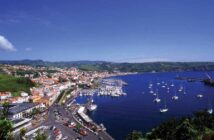- “Schindler’s List” (1993) – Directed by Steven Spielberg, this Academy Award-winning film tells the story of Oskar Schindler, a German businessman who saved the lives of over a thousand Jewish refugees during the Holocaust. The movie is set in Kraków, Poland.
- “Three Colours: Blue” (1993) – This acclaimed film by director Krzysztof Kieślowski is part of the “Three Colours” trilogy. Set in Warsaw, Poland, it explores themes of grief, liberty, and the human spirit.
- “Ida” (2013) – Directed by Paweł Pawlikowski, this award-winning film is a poignant drama set in Poland in the 1960s. It follows the journey of a young woman who discovers her Jewish heritage and confronts her family’s dark past.
- “Cold War” (2018) – Another powerful film by Paweł Pawlikowski, “Cold War” is a romantic drama set in post-war Poland. It tells the tumultuous love story between a music director and a young singer, against the backdrop of changing political ideologies.
- “Katyn” (2007) – Directed by Andrzej Wajda, “Katyn” is a historical drama that explores the massacre of Polish officers by the Soviet secret police during World War II. The film depicts the tragedy and the impact it had on Polish society in the years that followed.
- “Pan Tadeusz” by Adam Mickiewicz: Published in 1834, this epic poem is considered the national epic of Poland. It depicts Polish society and culture during the Napoleonic era.
- “The Doll” by Bolesław Prus: Published in 1890, this realist novel offers a critical portrayal of Polish society in the late 19th century. It explores themes of social classes and the consequences of pursuing wealth and power.
- “With Fire and Sword” by Henryk Sienkiewicz: This historical novel, published in 1884, takes place during the mid-17th-century Polish-Lithuanian Commonwealth. It follows the struggles between different factions for control over the region and explores themes of war, honor, and patriotism.
- “The Captive Mind” by Czesław Miłosz: Published in 1953, this novel reflects on the intellectual and moral challenges faced by Polish intellectuals during the period of Soviet-dominated communism. Miłosz presents a fictional account of the impact of totalitarianism on the human mind.
- “The Tin Drum” by Günter Grass: Although the author is German, this novel set in the Free City of Danzig (now Gdansk) offers a vivid portrayal of life in Poland before, during, and after World War II. It spans generations and explores themes such as history, identity, and the effects of war on individuals.
- “God’s Playground: A History of Poland” (Two Volumes) by Norman Davies: This comprehensive history covers over 1,000 years of Poland’s past. It explores Poland’s rise as a powerful state, its collapse as an independent entity, its role in the world wars, and its transformation into a socialist dictatorship under Soviet control. The book delves into Poland’s identity, encompassing the influence of Jews, Germans, Ukrainians, and Lithuanians, and includes anecdotes, poetry, and myths that have shaped the country’s character.
- “Twilight of Democracy” by Anne Applebaum: The book examines the shift in political dynamics in Poland and other post-communist countries since the new millennium. The author, Anne Applebaum, describes how intellectuals who were once united in rejoicing the fall of communism have become agents of populism, leading to the rise of populist-conservative parties like Poland’s Law and Justice party (PiS). Applebaum criticizes the weakening of Poland’s democracy through the politicization of courts and public media by the ruling party.
- “Drive Your Plow Over the Bones of the Dead” by Olga Tokarczuk: Set in a village in southwestern Poland, this eco-thriller follows a series of mysterious murders. The protagonist, an eccentric pensioner, suspects that animals are exacting revenge and clashes with the hunters and the Catholic church. Olga Tokarczuk, a renowned novelist and Nobel laureate, weaves allegory, astrology, and the poetry of William Blake into the narrative, creating a deep and layered story.
- “Solaris” by Stanislaw Lem: Stanislaw Lem’s science fiction novel takes readers to the fictional planet Solaris. A crew of scientists stationed in orbit above Solaris becomes immersed in a psychological and philosophical journey as they confront the sentient and enigmatic nature of the planet. Lem’s work stands out for its exploration of fundamentally mysterious worlds, often in contrast to what he perceived as intellectually shallow science fiction from British and American authors.
- “Ryszard Kapuściński: A Life” by Artur Domosławski: This controversial biography provides an in-depth look at Ryszard Kapuściński, a renowned Polish journalist. While acknowledging his courage and talent, the book also exposes his embellishments, poor personal life choices, and collaboration with Poland’s communist regime. Despite these flaws, Kapuściński’s work continues to inspire a new generation of journalists who value his contributions.
- “Pierogi” by Zuza Zak: Zuza Zak’s book explores Polish cuisine beyond its popular dish, pierogi (dumplings). Divided into historical and modern categories, the book offers over 50 recipes, including regional specialties. It highlights the importance of home-cooked food in Polish culture, seasonal variations in cuisine, and the evolving eating habits of Poles, such as the growing popularity of vegan options.
WANDERLIST: Poland in books and on film
0
Share.




